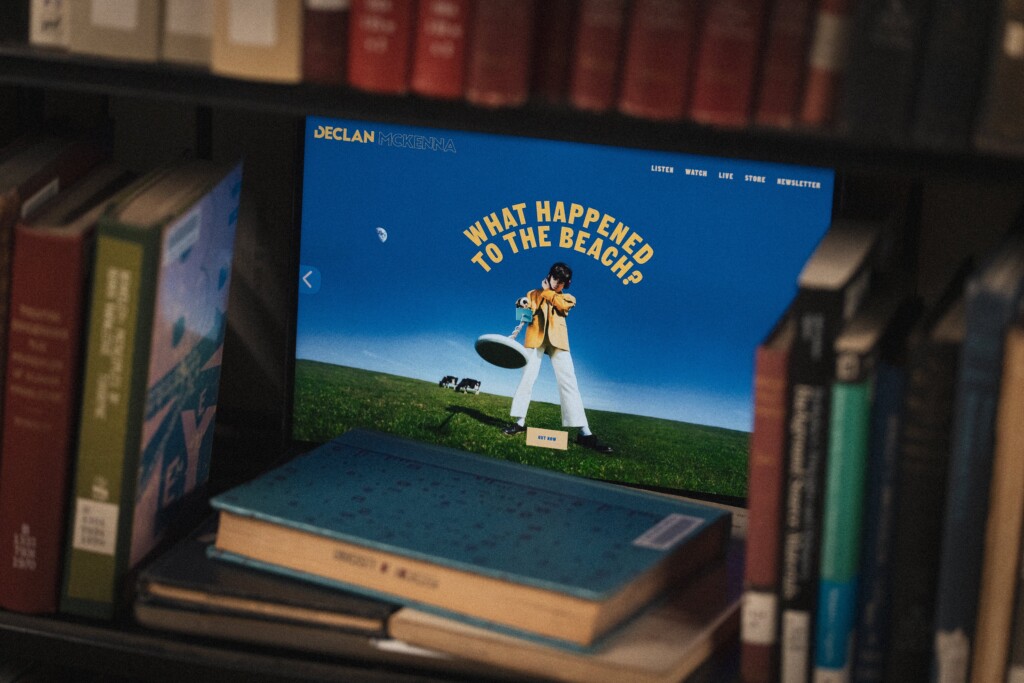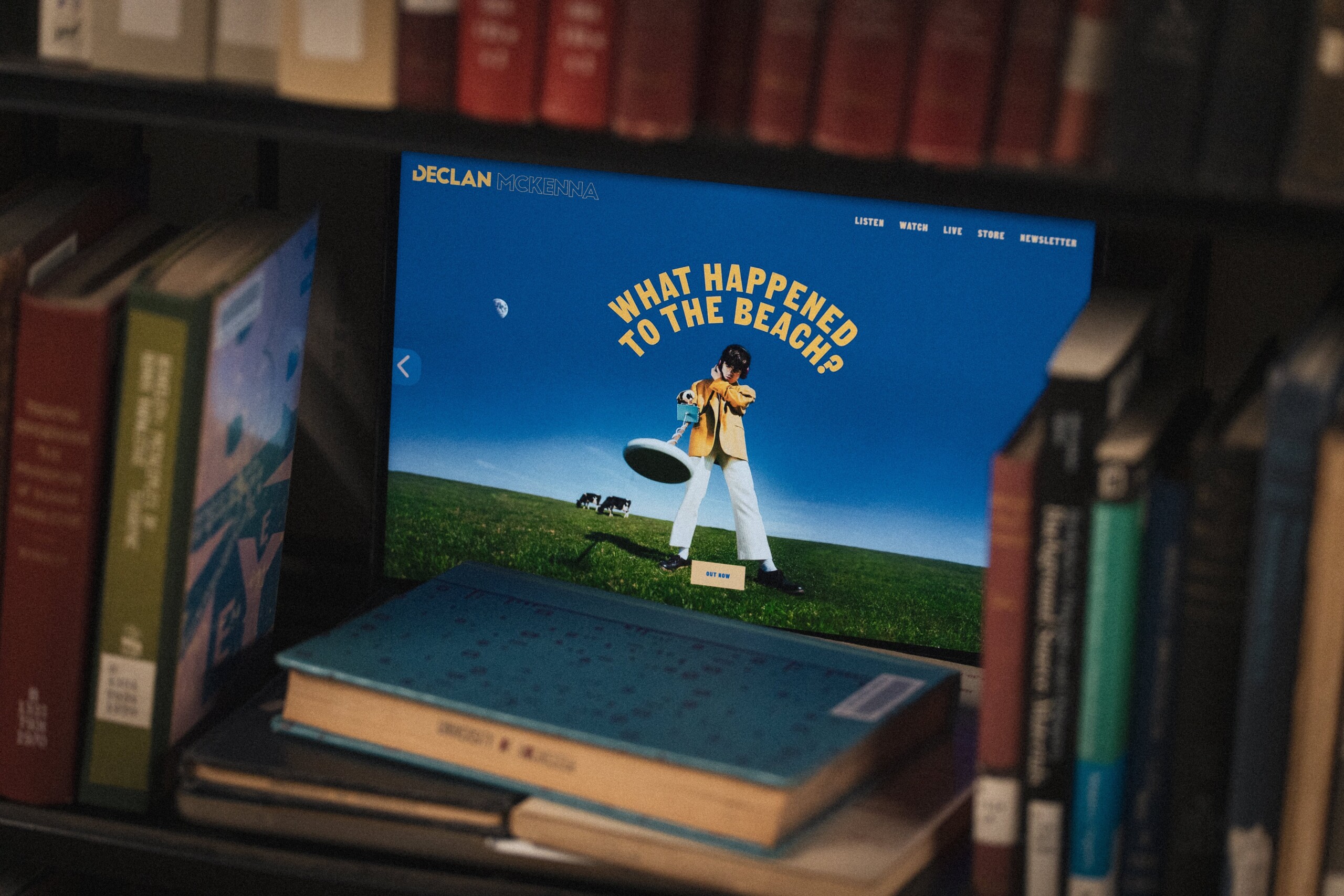Imagine you are spending a warm summer day in LA, the sun beaming down on your face, almost toxically green grass under your feet. What kind of music is playing in the background? Now, imagine that same music, except this time it is by a 25-year-old, mullet-sporting, Tottenham Spurs fan from London who is typically known for making electric guitar and drums-laden music about society’s problems. This is the case with Declan McKenna’s newest album, “What Happened to the Beach?”, released Feb. 9. His third album is inspired by his experiences in California and is the best proof yet of his artistic versatility.
McKenna’s first album, “What Do You Think About the Car?” (2017), is rife with social commentary. Most notable is his viral song “Brazil,” which is a criticism of the politics of FIFA and the 2014 FIFA World Cup. Bare vocals and instrumentals marked this first album — he had a lot of room to grow.
And grow he did. His next album “Zeros” was released in 2020, in the midst of the pandemic. While still echoing themes of rebellion from his past albums, it is a big leap from his previous music. It is a more fantastical, rage-filled, ‘70s-rock-inspired foray where McKenna tests his technical limits. Taking place in a dystopian space age, he addresses capitalism and climate change while telling the story of a fictional character named Daniel who has to deal with the impact of humans on a ruined Earth and run away to space. “Zeros” includes heavier instrumentals, heavier vocals, and amore futuristic vibe overall, reflecting McKenna’s growth.
However, this seemingly new era for McKenna ended almost as soon as it began.”My House,” his 2021 single released after “Zeros,” hinted at another musical tone shift.. As he continued to release singles — such as “Sympathy,” “Nothing Works,” “Elevator Hum,” and “Mulholland’s Dinner and Wine,” all of which are included on “What Happened to the Beach?” — this tone shift became clearer and clearer — and this time he was moving in a completely different direction, and three times as far.
From the first guitar strum on “WOBBLE,” the opening track off “What Happened to the Beach?”, it is evident that McKenna is about to take us on an entirely different journey from his first two albums. While “Isombard” from his first album makes me want to sprint, “Mulholland’s Dinner and Wine” makes me want to dance, specifically in an elevator with headphones on and where I have to abruptly stop when the doors open and someone walks in. While “Twice Your Size” and “Rapture” make me want to run around and destroy things, “Sympathy” and “Elevator Hum” are for driving through a golf course in a golf cart while wreckage burns in the distance. It is clearly a West Coast, ‘60s-inspired album with more groovy and psychedelic vibes.
One thing that remains consistent throughout McKenna’s discography is his brilliant lyricism that is often metaphorical and almost nonsensical at times. This album’s social commentary is done more subtly than usual, giving a window into McKenna’s own experiences. For example, in “Nothing Works,” he reflects on controlling music executives and never being able to please everyone with your art; “Mulholland’s Dinner and Wine” is about a made-up convenience store which McKenna says references “the darker underbelly of LA and the search for the dream lifestyle”; and in “I Write the News,” he comments on the current state of discourse, especially in the news, as well as London’s rent prices.
In regards to the music itself, he makes ample use of synths and returns to raw vocals and guitar while still including songs reminiscent of “Zeros” with their heavier sounds, such as “The Phantom Buzz (Kick In).” Each song is distinct, while also being well put together into a cohesive whole.
Another big difference is McKenna’s vocals. I saw him live in July 2023, not long after the release of “Sympathy,” and despite the smaller music venue, McKenna and his band played with enough power to fuel a music festival. During some of the songs from his setlist,the instrumentals were so loud that you couldn’t hear McKenna’s vocals. In contrast, for songs he performed like “Be An Astronaut,” “My House,” and “Sympathy,” McKenna shifted from screaming to serenading, from striking his guitar to strumming it, or plucking at his piano. It was like he was taking us through his own musical journey in real-time, preparing us for the change he was about to hit us with once “What Happened to the Beach?” released.
Admittedly, it took me until the second listen of “What Happened to the Beach?” to really get on board with his new sound. I mourned the loss of the empowerment I got from his older music, where I could curse out the world through his songs. And while I still prefer McKenna’s first two albums, I have now come to like this new one. I enjoy the sunny, cheerful air that he has introduced to his discography. It doesn’t matter if I understand the ultimate reason behind his musical shift; I still vibe to it, just in a different way. I welcome any future eras and question-titled albums that McKenna has yet to bring us as he starts to make music more for himself.



